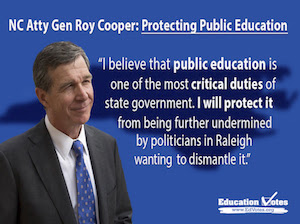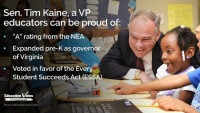MDE Launches Campaign to Recognize and
Celebrate Michigan Educators
September 26, 2016
LANSING – The Michigan Department of Education today launched a multi-media campaign to recognize and celebrate the great work being done by Michigan educators. The campaign is called “Proud Michigan Educator."
The campaign is a joint venture with the Skillman Foundation to elevate the prestige and respect of the teaching profession. The campaign will be highlighted through social media as #proudMIeducator.
“The Proud Michigan Educator campaign will express statewide and in each community throughout Michigan that we support and value teacher contributions to the education of our children and society,” said State Superintendent Brian Whiston.
In Michigan’s Plan to Ensure Equitable Access to Excellent Educators, it identified that one of the root cause for inequitable access and low teacher retention is the lack of respect given to the teaching profession.
“This makes attracting new talent to the profession and supporting and retaining those in the profession incredibly challenging,” Whiston said. “To recruit and retain excellent teachers, we need to improve the narrative and show greater respect and appreciation for the teaching profession.”
Stakeholder feedback during Michigan’s development of its state plan for the federal Every Student Succeeds Act (ESSA) indicated that a major barrier to improving educator quality, recruitment, and retention is the low morale among, and perceived lack of respect for, teachers and leaders.
Statistics show that the education professions are facing a looming crisis. In the next decade, 50 percent of the nation’s teachers – approximately 1.72 million – are expected to retire. As many as one-third of teachers leave the profession in their first three years, and almost 50 percent leave after five years. Half of new principals leave the profession within their first three years, and enrollment in teacher prep programs is down by more than one-third from 2009-10.
“We expect educators to prepare our children to thrive and lead in a global job market. In turn, they should be able to expect our support and deep appreciation for their work,” said Punita Thurman, program director for the Skillman Foundation, who leads the Foundation’s education investment strategy. “We know that in Detroit alone, nearly 10,000 teachers and 350 principals need to be recruited and retained over the next 10 years to adequately staff the city’s schools. This starts with honoring the profession.”
This social media-driven campaign is intended to demonstrate that Michigan values, honors, and supports its educators. The kick-off will include the release of a short video featuring Tracy Horodyski, Michigan’s current Teacher of the Year, her principal, colleagues, and students discussing the tremendous impact of both Ms. Horodyski and the teaching profession as a whole. The video release will be followed up with regular social and traditional media engagement activities, including additional videos and public participation opportunities.
To participate, Like/Follow MDE on social media:
Facebook: @MichDeptEd
Twitter: @MIEducation
Youtube: @MDE
Like, share, and comment on the videos throughout the year. Use #proudMIeducator to celebrate the work of Proud Michigan Educators.
# # #
|
|
 |
 |
 Key things to know about the charter school debate Key things to know about the charter school debate
At separate conventions this summer, the NAACP and the Black Lives Matter Movement-the nation's oldest and the youngest civil rights organizations-passed resolutions critical of charter schools and the privatization of education. We may have reached a watershed moment for market-based school choice. |
|
|
|
|
|
|
|
|
|  |
|
|
|
|
|
|
|
|
 |
 |
|
|
|
|
|
|
 An educator steps up for LGBTQ students of color An educator steps up for LGBTQ students of color
Students are struggling to understand not only what it means to be gay, but "the intersection of being both Black and gay and Hispanic and gay." It's a complex point-and the "crux of a lot of problems when people don't want to see, and accept, that overlap or intersectionality." |
|
|
|  |
|
|
|
|
|
|
| Issue #244 | September 16, 2016 |
|
|
|
|
|
Hill education chairs slam supplement not supplant proposal
Senator Lamar Alexander (R-TN) and Rep. John Kline (R-MN), chairmen of the Senate and House Education committees, issued statements strongly criticizing the Department of Education's (ED's) recently proposed supplement not supplant regulations. The proposed rulesprescribe several specific methods states can use (or an equivalent) to meet the Every Student Succeeds Act's (ESSA's) version of the long-standing ESEA requirement that Title I funds supplement state and local funds, not supplant them.
Alexander said the proposed regulations are inconsistent with ESSA's efforts to give more flexibility to states and "would give Washington, D.C., control over state and local education dollars that it has never had before. Federal law gives him [the secretary] zero authority to do this. In fact, our new law specifically prohibits his doing this." Alexander also stated that the regulations would "upend state and local education funding and collective bargaining agreements in many states" and that "if anything resembling it becomes final, I will do everything within my power to overturn it."
Kline was equally critical, describing the proposal as unlawful and damaging. According to Kline:
The Department of Education is threatening to unilaterally impose a multi-billion dollar regulatory tax on our nation's schools. This punitive policy will unleash havoc on schools and their students at a time when education leaders should be focused on helping children succeed in the classroom. America's poorest neighborhoods will be hit the hardest as communities are forced to relocate teachers, raise taxes, or both. Any supposed "flexibility" is really a limited set of bad choices dictated by the secretary of education. This is not at all what Congress intended, and those who helped enact this law cannot honestly believe differently.
In contrast, ranking committee members Senator Patty Murray (D-WA) and Rep. Bobby Scott (D-VA) issued a joint statement applauding the proposed rules, stating that the rules will both "ensure Title I dollars are used to supplement state and local investment in public education for high-need students" and are consistent with the rulemaking authority granted to ED through ESSA. Murray and Scott also urged ED to work with stakeholders, including members of Congress, toward "getting this right" in the final rule.
A sample of responses to the proposed rules from national education organizations can be found by clicking on these links: Council of Chief State School Officers; National School Boards Association; AASA, the School Superintendents Association; and the National Governors Association. As described in the last issue of ESEA/ESSA Update, NEA issued a response to the proposed rule which can be found here.
FairTest chronicles victories against excessive testing
A FairTest report on testing reforms around the country details progress in the fight against testing overuse and abuse, but calls for redoubled efforts to obtain state legislative and policy changes. The report, Assessment Reform Victories 2016: Less Testing, Lower Stakes, Better Learning Measures, summarizes the progress this way:
- Fewer states require exit exams
- Many states delinked teacher evaluations from test scores
- Dozens of jurisdictions across the U.S. cut back the amount of required testing
- Policymakers began to replace standardized exams with assessments that support high-quality teaching and learning
According to the report, ESSA "cracks the door open for states to build better systems of assessment and accountability. However, much more hard work is needed to unravel the damage caused by No Child Left Behind and win more testing policies that support learning."
Ad Council, ED, Mott Foundation team up to fight absenteeism
Nearly half of parents think it is okay for children to miss three or more days of school a month, according to new research from the Ad Council. To better educate parents about the harms of absenteeism and what can be done to prevent it, the Ad Council is partnering with ED and the Charles Stewart Mott Foundation on a new public service campaign, Absences Add Up. A range of public service announcements will encourage parents to visit http://absencesaddup.org/, a Web site with resources for parents seeking help. The Web site also has materials for teachers, community leaders, after school stakeholders, and mentoring partners.
A new study by the Attendance Works and the Everyone Graduates Center confirms the gravity of the absenteeism problem. According to the study, Preventing Missed Opportunity: Taking Collective Action to Confront Chronic Absence, more than 6.5 million students missed three or more weeks in one school year, half of whom were elementary school students. The study, which used data from ED's Civil Rights Data Collection, found that districts serving poor neighborhoods typically have high rates of absenteeism, reflecting structural problems that can discourage attendance such as inadequate health care and exposure to violence and environmental pollutants. The study offers several examples of successful initiatives around the country to reduce absenteeism.
ED, DOJ urge limits on use of school-based police
ED and the Department of Justice (DOJ) issued guidance to states and districts to ensure School Resource Officers (SROs) are used in a way that respects student civil rights. In a Dear Colleague letter, Secretary John King explained the reason for the guidance:
While these officers-commonly known as school resource officers (SROs)-can help provide a positive and safe learning environment and build trust between students and law enforcement officials in some situations, I am concerned about the potential for violations of students' civil rights and unnecessary citations or arrests of students in schools, all of which can lead to the unnecessary and harmful introduction of children and young adults into a school-to-prison pipeline.
The advice was delivered through a set of rubrics titled, the Safe, School-based Enforcement through Collaboration, Understanding, and Respect (SECURe) Rubrics. One detailed set of rubrics covers state and local policy, another abbreviated set covers local implementation. Both sets highlight five action steps as follows:
- Create sustainable partnerships and formalize memoranda of understanding (MOUs) among school districts, local law enforcement agencies, juvenile justice entities, and civil rights and community stakeholders.
- Ensure that MOUs meet constitutional and statutory civil rights requirements.
- Recruit and hire effective SROs and school personnel.
- Keep your SROs and school personnel well trained.
- Continually evaluate SROs and school personnel, and recognize good performance.
DOJ's Dear Colleague letter was sent from the Office of Community Oriented Policing Services (COPS), which has provided funding for more than 7,000 SROs since 1996.
ED adds socioeconomic diversity to supplemental priority list
ED has added socioeconomic diversity to the list of priorities that it may deploy for future discretionary grant competitions. The new priority joins a list of 15 other supplemental prioritiesthat were finalized for use as needed in December 2014. NEA supported the new priority during the comment period, noting that socioeconomic diversity strategies are a "promising approach to raising student achievement, closing achievement gaps, and promoting racial and ethnic diversity."
Take Action
House and Senate appropriations committees have recommended funding for ESSA's first year well below what Congress authorized when it passed the new law. Tell Congress to support increased investments in education with priority given to formula-funded programs serving students most in need. |
|
Questions or comments?
Contact the Education Policy and Practice Department at ESEAinfo@nea.org.
|
|
|












































































